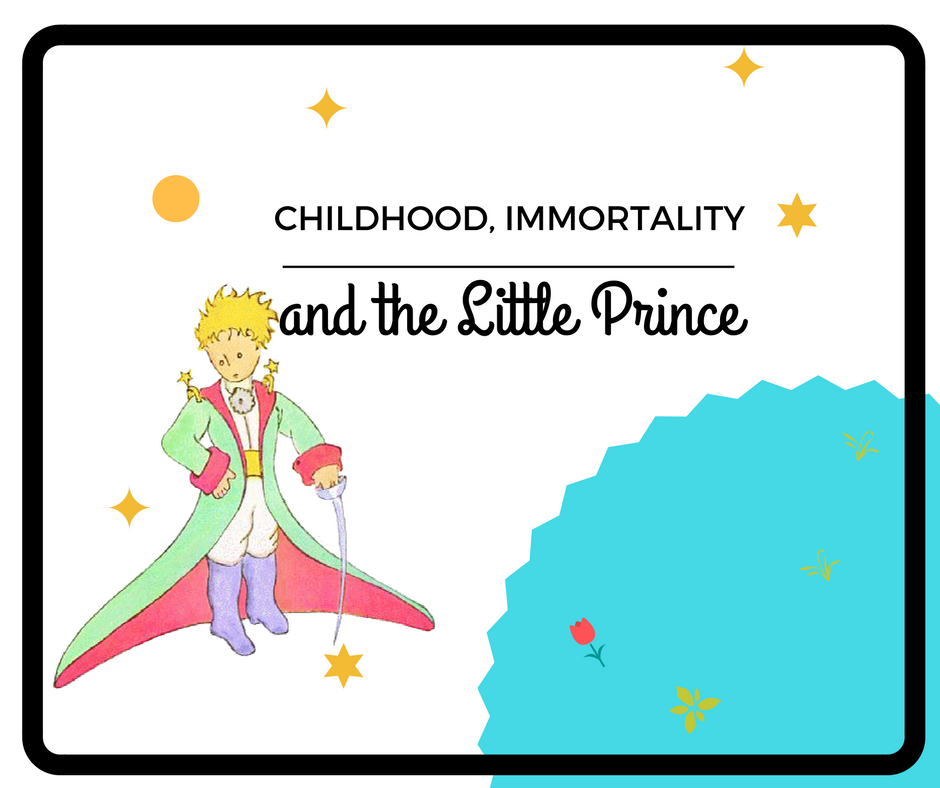
Esta entrada también está disponible en: Spanish
Childhood, Immortality and the Little Prince
By Chris Du-Pond
A treasure I inherited from my grandmother “Nanný” when she passed, was a soft copy of The Little Prince (Le Petit Prince) by Antone de Saint-Exupéry. It is a beautiful 1946 edition in French with original illustrations. This book has been read, that I know, by at least five generations in our family (my daughters included) in its original language.
This tiny book of less than 100 pages is the fourth most translated book in history; it has been translated to over 250 languages and it grosses annual sales of over two million copies. In France it was named the most noteworthy book of the 20th century.
And here we may ask: ¿What is so extraordinary about a story for children?
After wrestling with this question for some time, I concluded that The Little Prince touches the heart of the reader because it deals marvelously with two deeply held human longings:
The first theme is the deep desire we have to preserve the imagination and innocence of our childhood. There is something supremely special in childhood that we lose with time. We tend to stop dreaming about becoming a fireman or an astronaut; we stop playing with marbles and cars; our bike ceases to be a rapid stallion, and the tree in the middle of the park is no longer a rocket to distant worlds in outer space. We leave behind the time when a girlfriend was a soft whisper and never a kiss. That age when our “whys” would not let people rest. To grow up eventually becomes the slow murder of the child we all have within. We lose a type of purity to be replaced by selfishness, envy, arrogance, and worse. Growing up is, in a sense, tragic.
In the process of becoming an adult, we realize it is time to attend the funeral of the child we once were. He left us one day, almost without knowing and without saying goodbye.
The second theme in The Little Prince is the deep human longing to attain immortality. At the end of the novel (serious spoiler ahead), the Little Prince is confronted with a yellow serpent, the type that “kills you in less than thirty seconds.” “Do you have good venom?, Are you sure I will not suffer long?” Asked the Little Prince. Finally, the serpent’s venom would become his ticket to “go back home” to asteroid B 612 with his rose, his volcanoes, his sunsets, and his sheep.
“The following morning”, Antoine tells us, “I was comforted…though not completely. Because I know well that he is back to his planet, for I could not find his body on the sand.”
I remember reading The Little Prince many times as a kid, but I don’t remember ever feeling anguish or nostalgia after the episode with the yellow serpent. Besides, the Little Prince returned to his planet, with his flower, his sheep, and his sunrises! That is how I saw it. But now as an adult, mind and reason tell me that he was bitten by a poisonous snake. The Little Prince must have surely died…that is what happens when you are wounded by a viper. In the final analysis, we long to continue to be like a child. There is this strange relationship between eternity and childhood that we lose with the passing of the years.
In the final analysis, we long to continue to be like a child. There is this strange relationship between eternity and childhood that we lose with the passing of the years. But, I believe this relationship is very real and that is the reason this book has touched the hearts of many. We have, very deep in our soul, a desire and a thirst for eternal things, to live forever…
Another great writer, C.S. Lewis, also identified, at least in part, this relationship:
“If we find ourselves with a desire that nothing in this world can satisfy, the most probable explanation is that we were made for another world.” 1
But the main reason I believe this relationship between childhood and eternity to be real, is because many centuries before Antoine de Saint-Exupéry, another person in history spoke of the very same thing:
«Let the children come to me, and do not hinder them, for to such belongs the kingdom of God. Truly, I say to you, whoever does not receive the kingdom of God like a child shall not enter it» Luke 18:16-17
As wonderful as it is, the story of The Little Prince is not telling us anything new. Jesus, the “Logos”, spoke something similar over 2000 years ago—and not in the context of a novel but in real life. I am convinced that the success of the Little Prince is due to the fact that the story got too close to a heartfelt human longing to endure, to transcend the stars, mock death, and return to our innocent origins. We all desire that. “If we find ourselves with a desire that nothing in this world can satisfy, the most probable explanation is that we were made for another world.”
The difference between Jesus and Saint-Exupéry is that the latter incorporated into a story this innate desire of his in a manner that we could relate, almost without realizing that we longed for it to begin with. However, it was Jesus whom, “in the beginning,” put this desire within the human soul. Jesus is, not only the originator of this story but of the desire itself! And here, I submit to you something very simple: what we need is indeed to become like children and run to His arms to unchain the eternity captive in the dungeon of our hearts. He said, “whoever believes in me has eternal life” (John 6:47).
“God has made everything beautiful in its time. Also, he has put eternity into man’s heart” Ec. 3:11
- CS Lewis, Mere Christianity (San Francisco: Harper San Francisco Publishers, 2001), 136-137. ↩


